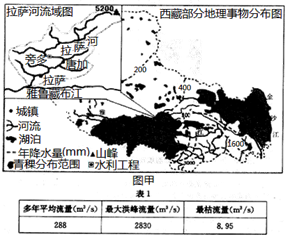西藏地区平均海拔在4000米以上,形成了独特的自然地理环境。图甲为“西藏部分地理事物分布图,表1为拉萨河上的拉萨水文站径流量特征值表,图乙为拉萨河下游河谷地带土地利用变化示意图。结合图表材料,回答下列问题。(9分)


(1)青稞是青藏高原特有的粮食作物,据图说出西藏地区青稞分布的主要特点。(3分)
(2)2011年10月26日,被誉为“西藏三峡”的旁多水利枢纽工程截流成功,标志着该工程进入主体建设阶段。简述旁多水利枢纽工程的建设对拉萨市的积极影响。(3分)
(3)结合拉萨河下游河谷地带土地利用状况的变化特征,就实现当地的农业可持续发展,提出合理化建议。(3分)
(1)主要分布在降水适中(较丰富)的东南部河谷(海拔较低)地带。(3分,东南部、河谷地带、降水适中,各1分)
(2)为拉萨市提供电能;减少洪涝对拉萨市的危害;提供充足稳定的城市用水。(3分)
(3)调整农业结构(退耕还林还草、发展观光农业等);节约用地(控制城镇工矿交通建设用地);加大农业投入,提高土地利用效益(科技兴农、集约化经营,发展商效农业);加强生态建设(保护农业生态环境)。(答对其中三点即可,3分)
本题考查我国的区域地理。
(1)结合图示判断:阴影部分位于西藏的东南部,河谷地带;地势略低,气温较高,适宜农业生产。
(2)图示旁多水利工程位于拉萨上游,水利工程的主要作用:防洪、发电、供水等方面分析。
(3)结合图乙的土地利用方式变化:农田面积、城镇工矿业交通用地扩大,而林地、草地、水域面积缩小;故从可持续发展角度,需要退耕还林,还草、还湿;保护植被;节约用地,控制城镇工矿业、交通用地等
